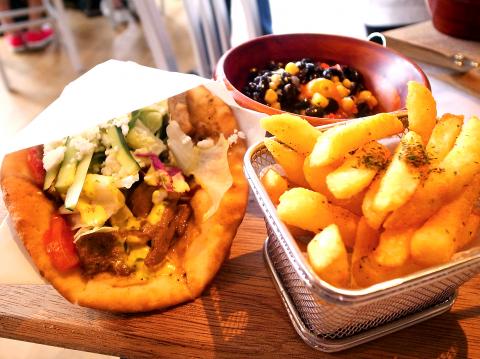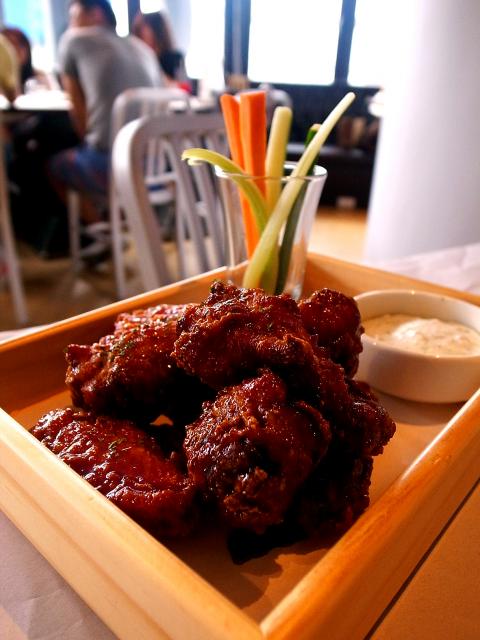Crowded with tourists and teens, Ximending (西門町) doesn’t quickly spring to mind when thinking of places to relax. But with the addition of Amba Taipei (amba意舍), a hotel that opened in February, and its dining outlet Chiba (吃吧), unwinding is on the menu.
A new brand from the Ambassador Hotel Group (國賓飯店集團), Amba Taipei was designed by an international team including Taiwan-born, Bangkok-based interior designer Eugene Yeh (葉裕清), artist Marvin Minto Fang (范姜明道) and Chinese graphic designer Deng Bingbing (鄧兵兵).
The vibe is young and chic. Sunlight streams through a skylight into the lobby, populated by potted trees and flowers, while an array of colorful installation art works vies for attention on the other side of the room. The facilities are playfully and straightforwardly named. Take for example Wenba (問吧) the hotel

Photo: Ho Yi, Taipei Times
counter, which is made out of recycled plastic bottles. In Mandarin the name means “ask.”
This fun-loving spirit continues in Chiba, where the open space is divided not by walls but bookshelves. Toys, games and vintage items such as an old vinyl player are among the knickknacks displayed on the shelves. Books are abundant too and cover a diversity of interests and topics.
The menu offers a compact selection of generously portioned light meals, including soup and salads, at wallet-friendly prices. Service here is more of a casual, do-it-yourself affair. First, diners choose what they want to eat on an order sheet, which is taken to the ring-shaped bar to settle the bill. The dishes are then prepared by a group of young, uniformed cooks, and brought to the table.

Photo: Ho Yi, Taipei Times
Gyros and panini feature predominantly on the menu. The Greek lamb gyro bread (NT$260) is a yummy option made of chewy pita bread filled with tender roast lamb, goat cheese, lettuce, tomato and mint yogurt sauce. The Italian meatball panini (NT$200 for a half serving and NT$320 for full serving), made of mozzarella, basil, beef meatballs and garlic and tomato sauce, is another flavorful sandwich.
For herbivores, the vegetarian gyro bread (NT$240), made of slices of cucumber, yellow and red bell pepper, mozzarella and fresh arugula leaves, is a pleasantly nutty and bitter sandwich.
While the main dishes are mostly pastas, such as spaghetti carbonara with ham (NT$280) and seafood linguine arrabiata (NT$300), appetizers and snacks have a more universal appeal. Items include beer battered fish and chips (NT$180), grilled lamb kebabs with mint yogurt dressing (NT$200) and Korean fried chicken wings (NT$180), which are slightly spicy and sweet and come with a mayonnaise dipping sauce.
The beverage menu contains only nonalcoholic drinks, including freshly squeezed juice (NT$100 to NT$130), teas (NT$120 to NT$150) and coffees (NT$80 to NT$140).
Tipplers should check out the hotel’s lounge bar, Tingba (聽吧), where vinyl records are used as curtains, and jeans and amplifiers are made into decorative art.

US President Donald Trump may have hoped for an impromptu talk with his old friend Kim Jong-un during a recent trip to Asia, but analysts say the increasingly emboldened North Korean despot had few good reasons to join the photo-op. Trump sent repeated overtures to Kim during his barnstorming tour of Asia, saying he was “100 percent” open to a meeting and even bucking decades of US policy by conceding that North Korea was “sort of a nuclear power.” But Pyongyang kept mum on the invitation, instead firing off missiles and sending its foreign minister to Russia and Belarus, with whom it

When Taiwan was battered by storms this summer, the only crumb of comfort I could take was knowing that some advice I’d drafted several weeks earlier had been correct. Regarding the Southern Cross-Island Highway (南橫公路), a spectacular high-elevation route connecting Taiwan’s southwest with the country’s southeast, I’d written: “The precarious existence of this road cannot be overstated; those hoping to drive or ride all the way across should have a backup plan.” As this article was going to press, the middle section of the highway, between Meishankou (梅山口) in Kaohsiung and Siangyang (向陽) in Taitung County, was still closed to outsiders

Many people noticed the flood of pro-China propaganda across a number of venues in recent weeks that looks like a coordinated assault on US Taiwan policy. It does look like an effort intended to influence the US before the meeting between US President Donald Trump and Chinese dictator Xi Jinping (習近平) over the weekend. Jennifer Kavanagh’s piece in the New York Times in September appears to be the opening strike of the current campaign. She followed up last week in the Lowy Interpreter, blaming the US for causing the PRC to escalate in the Philippines and Taiwan, saying that as

The Chinese Communist Party (CCP) has a dystopian, radical and dangerous conception of itself. Few are aware of this very fundamental difference between how they view power and how the rest of the world does. Even those of us who have lived in China sometimes fall back into the trap of viewing it through the lens of the power relationships common throughout the rest of the world, instead of understanding the CCP as it conceives of itself. Broadly speaking, the concepts of the people, race, culture, civilization, nation, government and religion are separate, though often overlapping and intertwined. A government